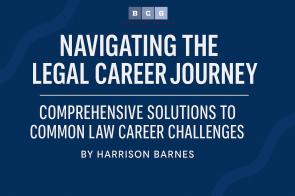
This article explores strategies attorneys can use to persevere through rejection and obstacles in the law firm environment. By focusing on persistence, developing critical skills, and building a strong professional profile, attorneys can ultimately achieve success in the competitive world of law firms.
- Harrison Barnes explores emotional challenges in law firms in The seven deadly burdens law firm attorneys face—a must-watch for understanding how rejection, insecurity, and isolation can drain resilience.
1. Law Firm Market Forces: A Complex Reality
The legal job market is influenced by external forces beyond the control of any individual attorney. Law firms make hiring decisions based on not only the merits of a candidate but also on market trends, economic conditions, and internal priorities. Attorneys can face rejection simply because a firm is not in a position to hire, regardless of their qualifications.
For example, an attorney specializing in corporate law with a solid academic background and strong work experience faced multiple rejections. The issue wasn’t a lack of talent or skills, but rather that the market for corporate law was slow due to economic uncertainty. Firms weren’t actively hiring in this area, and the attorney had to broaden their search to include smaller firms and different practice areas.
It is crucial for attorneys to recognize that rejection can often result from market forces and not personal shortcomings. A firm may be hiring less because of shifting economic conditions, or the practice area may be facing less demand. By understanding these broader dynamics, attorneys can manage rejection more effectively, knowing that their qualifications are still valuable even if the timing isn’t right.
- Need actionable strategies? Don’t miss Turning setbacks into success—overcoming rejection in your legal career, where attorneys share how they reframed rejection as a stepping stone to top-firm placements.
See Related Articles:
- Mastering the Legal Job Market: Overcoming the Top Reasons for Attorney Rejection
- Navigating the Legal Job Market in Non-Sophisticated Markets
- Why Every Attorney Should Look at Multiple Legal Markets When Doing a Job Search
Persistence is a crucial quality in the legal profession, especially when navigating rejection. A powerful comparison can be drawn from the entertainment industry, where rejection is part of daily life for actors. Many successful actors audition hundreds of times before landing their first significant role, often enduring years of rejection before gaining recognition.
To understand why rejection occurs in the first place, read Breaking Barriers: Why Law Firms Reject Attorneys and How You Can Turn It Around.
Attorneys can take a page from this playbook by maintaining persistence in their job searches and career progression. Just like actors, who face rejection on a routine basis, attorneys must continue applying to multiple firms, refining their resumes and strategies, and pushing forward despite setbacks.
In one instance, an attorney applied to over 50 firms before finally securing an offer. The persistence paid off after months of refining their application materials and seeking feedback to improve their interview performance. Although the experience was difficult, it proved that resilience and persistence are often the key factors in overcoming rejection.
Much like casting directors in the entertainment industry, law firms are looking for candidates who fit their immediate needs. Just because an attorney is rejected does not mean they are unqualified—it simply means the firm’s requirements or culture didn’t align at that time. Attorneys must emulate the persistence seen in the entertainment world, continually refining their approach, and ultimately finding the right firm for their skills.
- For a powerful complement, see The power of focus and resilience in law and leadership—real stories that demonstrate how unwavering focus can support growth during career turbulence.
3. Building a Strong Resume: Presentations, Papers, and Publications
One way for attorneys to stand out and mitigate the effects of rejection is by strengthening their professional profiles. An effective strategy is to enhance their resumes with industry involvement, publications, and presentations. Many attorneys focus solely on job experience, but contributions to the legal community through writing and speaking can make a substantial difference.
- And while enhancing your resume, don’t overlook critical resume cleanup tips every attorney needs, which can eliminate red flags and sharpen your professional presentation.
For example, publishing articles in legal journals or presenting at industry conferences showcases an attorney’s thought leadership and commitment to their field. These activities signal to law firms that the attorney is invested in advancing their knowledge and contributing to the profession, making them more attractive candidates, particularly for lateral moves or partnership considerations.
One attorney, after facing numerous rejections, decided to start publishing articles on key topics in their practice area. This effort not only boosted their resume but also provided them with valuable talking points during interviews. As a result, the attorney started receiving more positive responses from firms, eventually landing several interviews and offers.
One way to minimize rejection is by refining your preparation—and Mastering the Art of Legal Interviews provides the tools to make every interview count.
Involvement in writing, publishing, or delivering presentations demonstrates initiative and expertise. Law firms value attorneys who actively contribute to their practice area, and these accomplishments can help candidates stand out in a crowded job market.
- Learn practical steps for thriving despite setbacks in Mastering the Legal Job Market: Overcoming the Top Reasons for Attorney Rejection.
See Related Articles:
- Top 6 Things Attorneys and Law Students Need to Remove from Their Resumes ASAP
- How Attorneys and Law Students Should Write a Legal Resume
- How to Explain the Employment Gap in Your Resume
Rejection from a law firm should not be viewed as the end of the road. Instead, each rejection offers valuable feedback that can be used to improve an attorney’s resume, interview technique, and overall presentation. Attorneys who consistently reflect on their rejections and take steps to adjust their approach are better positioned to succeed in the long run.
For example, an attorney who faced repeated rejections realized their resume was too focused on academic achievements, without sufficiently highlighting their practical legal experience. By revising the resume to emphasize internships, clerkships, and relevant casework, the attorney saw an increase in interview invitations.
This experience illustrates the importance of treating rejection as an opportunity for growth. Law firms often look for practical skills in addition to academic credentials, and attorneys must showcase their real-world legal experience to appeal to hiring managers. By refining their applications and making necessary adjustments, attorneys can improve their chances of success after facing initial setbacks.
- To gain further insight, read Resilience-building lessons for attorneys facing tough setbacks, where attorneys transformed rejections into confidence and eventually secured roles at top firms.
5. Networking and Expanding Professional Relationships
Networking plays an essential role in overcoming rejection and advancing within law firms. Attorneys who build strong professional networks increase their visibility and create opportunities, even when they face obstacles in traditional job applications. Networking can be especially valuable for attorneys who have been turned down by multiple firms, as it allows them to make personal connections that may lead to referrals or informal job offers.
One attorney, after facing several rejections, focused on expanding their professional network. They attended legal conferences, joined bar associations, and reconnected with former colleagues. Through these efforts, they were introduced to a senior partner at a firm looking for an associate with their specific skill set. The networking connection led to an informal meeting and, eventually, a job offer.
This example highlights the importance of networking in the legal profession. Even when traditional job applications result in rejection, building strong relationships with other professionals can open doors. Networking also offers the opportunity to seek mentorship and support during challenging times, helping attorneys navigate their career paths more effectively.
- Understanding the current market is critical—it helps to review 2025 law firm recruitment trends for laterals and students, which offers updated insights on shifting hiring behaviors across the industry.
See Related Articles:
- Ways to Leverage Your Network
- How Attorneys Can Network: Why Networking is Essential to Attorney Success
- 10 Ways to Reciprocate in Networking
Attorneys who remain flexible and open to new opportunities are often better equipped to handle rejection and setbacks. Flexibility allows attorneys to explore alternative career paths or practice areas they may not have previously considered. While rejection from a law firm can be discouraging, it may lead attorneys to opportunities that align better with their strengths and interests.
- For a real-life testament, read Lorraine D’Alessio’s extraordinary resilience story, showcasing how personal adversity was met with remarkable strength.
For instance, one attorney who was repeatedly rejected by traditional law firms accepted a role at a legal tech company. The experience provided them with valuable knowledge in compliance and legal innovation, ultimately making them more desirable to law firms seeking attorneys with tech expertise. This unexpected opportunity allowed the attorney to build a unique skill set that later opened doors to higher-level roles at major firms.
The ability to adapt and pivot in response to rejection can be a significant career asset. Attorneys should remain open to exploring different practice areas, industries, or non-traditional legal roles, as these experiences can enhance their skills and marketability.
- Resilience isn’t just mental toughness—it’s well-being too. Check out Managing lawyer stress: resilience through well-being for practical tactics on handling the emotional burden of legal careers.
7. Long-Term Perspective: Rejection as a Temporary Setback
It’s essential for attorneys to maintain a long-term perspective when navigating the ups and downs of working in a law firm. Just because an attorney is rejected for a position or passed over for a promotion doesn’t mean their career trajectory is stalled. Often, rejection is a temporary setback that can lead to future success with persistence and strategic adjustments.
For attorneys seeking partnership, patience is critical. Partnership decisions are often influenced by firm economics, client demand, and internal dynamics, which can shift over time. Attorneys who remain dedicated, continue to build strong relationships within the firm, and take on leadership roles are more likely to succeed in the long run.
One attorney, after being passed over for partnership despite several years of strong performance, took proactive steps to open a dialogue with firm leadership. By seeking feedback, outlining their contributions, and focusing on client development, the attorney eventually achieved partnership when the firm revisited its decisions the following year.
This example highlights the importance of resilience, patience, and open communication in navigating law firm challenges. Attorneys must keep the long-term picture in mind and stay committed to their career goals, even in the face of rejection or temporary setbacks.
- Confidence plays a vital role in this journey—see Building confidence: the cornerstone of resilience in law to explore how self-belief counters stress and doubt in demanding firm environments.
Conclusion: Thriving in Law Firms Through Resilience and Persistence
Rejection is an inevitable part of working in law firms, but it does not define an attorney’s career. By learning from each setback, staying persistent, and building strong professional relationships, attorneys can develop the resilience needed to thrive in the competitive legal profession. For practical solutions on rejection, pivots, and long-term momentum, see Navigating the Legal Career Journey: Comprehensive Solutions to Common Law Career Challenges.
- To complement these strategies, see The Power of Focus and Resilience: Lessons from Law, Life, and Leadership, which highlights real-life lessons on maintaining resilience in law and leadership.
Success in law firms requires more than just talent—it demands adaptability, a willingness to improve, and a long-term perspective. Attorneys who embrace rejection as part of the journey, continuously refine their approach, and remain open to new opportunities will ultimately find their path to success in the legal world.
- To understand the perspective behind this advice, explore The story behind BCG Attorney Search and its resilience mission—Harrison’s long-standing commitment to attorney growth adds depth to this guidance.
1. What are the most effective strategies for career growth in law firms?
Answer: Career growth in law firms requires a combination of focus, resilience, and strategic networking. Attorneys should seek meaningful mentorship, demonstrate consistent performance on high-value matters, and proactively communicate their career goals. Leveraging insights from legal recruiters can also help identify opportunities for advancement. Explore BCG Attorney Search to discover openings that align with your growth objectives.2. How can attorneys maintain resilience after experiencing rejection in a law firm?
Answer: Resilience comes from reframing setbacks as learning opportunities and staying committed to long-term career goals. Attorneys should reflect on feedback, maintain a support network, and focus on building skills that increase their marketability. Engaging with legal recruiter guidance can also help navigate challenges and uncover new career paths.3. Why is focus critical for lawyers seeking partner promotions or leadership roles?
Answer: Focus ensures that attorneys consistently deliver high-quality work and make strategic choices about which matters to pursue. By prioritizing impactful projects and cultivating relationships with decision-makers, lawyers increase their visibility and chances for promotion. BCG Attorney Search offers resources and insights to help attorneys identify paths to partner and leadership roles.4. Can lateral moves enhance an attorney’s career growth and job satisfaction?
Answer: Yes, lateral moves can provide exposure to new practice areas, cultures, and opportunities for higher compensation or responsibility. Strategically timed transitions allow attorneys to leverage their skills in firms that better match their long-term goals. Consulting a legal recruiter can ensure that lateral moves align with both career growth and professional satisfaction.5. Should attorneys rely on legal recruiters to advance their law firm careers?
Answer: Absolutely. Legal recruiters offer insider knowledge of law firm hiring practices, market trends, and emerging opportunities that may not be publicly advertised. They can guide attorneys on positioning themselves effectively for promotions, lateral moves, or BigLaw to boutique transitions. BCG Attorney Search provides experienced recruiter support to help attorneys navigate these career decisions successfully.`
About Harrison Barnes
No legal recruiter in the United States has placed more attorneys at top law firms across every practice area than Harrison Barnes. His unmatched expertise, industry connections, and proven placement strategies have made him the most influential legal career advisor for attorneys seeking success in Big Law, elite boutiques, mid-sized firms, small firms, firms in the largest and smallest markets, and in over 350 separate practice areas.
A Reach Unlike Any Other Legal Recruiter
Most legal recruiters focus only on placing attorneys in large markets or specific practice areas, but Harrison places attorneys at all levels, in all practice areas, and in all locations-from the most prestigious firms in New York, Los Angeles, and Washington, D.C., to small and mid-sized firms in rural markets. Every week, he successfully places attorneys not only in high-demand practice areas like corporate and litigation but also in niche and less commonly recruited areas such as:
- Immigration Law
- Workers Compensation
- Insurance
- Family Law
- Trust and Estate
- Municipal law
- And many more...
This breadth of placements is unheard of in the legal recruiting industry and is a testament to his extraordinary ability to connect attorneys with the right firms, regardless of market size or practice area.
Proven Success at All Levels
With over 25 years of experience, Harrison has successfully placed attorneys at over 1,000 law firms, including:
- Top Am Law 100 firms such including Sullivan and Cromwell, and almost every AmLaw 100 and AmLaw 200 law firm.
- Elite boutique firms with specialized practices
- Mid-sized firms looking to expand their practice areas
- Growing firms in small and rural markets
He has also placed hundreds of law firm partners and has worked on firm and practice area mergers, helping law firms strategically grow their teams.
Unmatched Commitment to Attorney Success - The Story of BCG Attorney Search
Harrison Barnes is not just the most effective legal recruiter in the country, he is also the founder of BCG Attorney Search, a recruiting powerhouse that has helped thousands of attorneys transform their careers. His vision for BCG goes beyond just job placement; it is built on a mission to provide attorneys with opportunities they would never have access to otherwise. Unlike traditional recruiting firms, BCG Attorney Search operates as a career partner, not just a placement service. The firm's unparalleled resources, including a team of over 150 employees, enable it to offer customized job searches, direct outreach to firms, and market intelligence that no other legal recruiting service provides. Attorneys working with Harrison and BCG gain access to hidden opportunities, real-time insights on firm hiring trends, and guidance from a team that truly understands the legal market. You can read more about how BCG Attorney Search revolutionizes legal recruiting here: The Story of BCG Attorney Search and What We Do for You.
The Most Trusted Career Advisor for Attorneys
Harrison's legal career insights are the most widely followed in the profession.
- His articles on BCG Search alone are read by over 150,000 attorneys per month, making his guidance the most sought-after in the legal field. Read his latest insights here.
- He has conducted hundreds of hours of career development webinars, available here: Harrison Barnes Webinar Replays.
- His placement success is unmatched-see examples here: Harrison Barnes' Attorney Placements.
- He has created numerous comprehensive career development courses, including BigLaw Breakthrough, designed to help attorneys land positions at elite law firms.
Submit Your Resume to Work with Harrison Barnes
If you are serious about advancing your legal career and want access to the most sought-after law firm opportunities, Harrison Barnes is the most powerful recruiter to have on your side.
Submit your resume today to start working with him: Submit Resume Here
With an unmatched track record of success, a vast team of over 150 dedicated employees, and a reach into every market and practice area, Harrison Barnes is the recruiter who makes career transformations happen and has the talent and resources behind him to make this happen.
A Relentless Commitment to Attorney Success
Unlike most recruiters who work with only a narrow subset of attorneys, Harrison Barnes works with lawyers at all stages of their careers, from junior associates to senior partners, in every practice area imaginable. His placements are not limited to only those with "elite" credentials-he has helped thousands of attorneys, including those who thought it was impossible to move firms, find their next great opportunity.
Harrison's work is backed by a team of over 150 professionals who work around the clock to uncover hidden job opportunities at law firms across the country. His team:
- Finds and creates job openings that aren't publicly listed, giving attorneys access to exclusive opportunities.
- Works closely with candidates to ensure their resumes and applications stand out.
- Provides ongoing guidance and career coaching to help attorneys navigate interviews, negotiations, and transitions successfully.
This level of dedicated support is unmatched in the legal recruiting industry.
A Legal Recruiter Who Changes Lives
Harrison believes that every attorney-no matter their background, law school, or previous experience-has the potential to find success in the right law firm environment. Many attorneys come to him feeling stuck in their careers, underpaid, or unsure of their next steps. Through his unique ability to identify the right opportunities, he helps attorneys transform their careers in ways they never thought possible.
He has worked with:
- Attorneys making below-market salaries who went on to double or triple their earnings at new firms.
- Senior attorneys who believed they were "too experienced" to make a move and found better roles with firms eager for their expertise.
- Attorneys in small or remote markets who assumed they had no options-only to be placed at strong firms they never knew existed.
- Partners looking for a better platform or more autonomy who successfully transitioned to firms where they could grow their practice.
For attorneys who think their options are limited, Harrison Barnes has proven time and time again that opportunities exist-often in places they never expected.
Submit Your Resume Today - Start Your Career Transformation
If you want to explore new career opportunities, Harrison Barnes and BCG Attorney Search are your best resources. Whether you are looking for a BigLaw position, a boutique firm, or a move to a better work environment, Harrison's expertise will help you take control of your future.
Submit Your Resume Here to get started with Harrison Barnes today.
Harrison's reach, experience, and proven results make him the best legal recruiter in the industry. Don't settle for an average recruiter-work with the one who has changed the careers of thousands of attorneys and can do the same for you.
About BCG Attorney Search
BCG Attorney Search matches attorneys and law firms with unparalleled expertise and drive, while achieving results. Known globally for its success in locating and placing attorneys in law firms of all sizes, BCG Attorney Search has placed thousands of attorneys in law firms in thousands of different law firms around the country. Unlike other legal placement firms, BCG Attorney Search brings massive resources of over 150 employees to its placement efforts locating positions and opportunities its competitors simply cannot. Every legal recruiter at BCG Attorney Search is a former successful attorney who attended a top law school, worked in top law firms and brought massive drive and commitment to their work. BCG Attorney Search legal recruiters take your legal career seriously and understand attorneys. For more information, please visit www.BCGSearch.com.
Harrison Barnes does a weekly free webinar with live Q&A for attorneys and law students each Wednesday at 10:00 am PST. You can attend anonymously and ask questions about your career, this article, or any other legal career-related topics. You can sign up for the weekly webinar here: Register on Zoom
Harrison also does a weekly free webinar with live Q&A for law firms, companies, and others who hire attorneys each Wednesday at 10:00 am PST. You can sign up for the weekly webinar here: Register on Zoom
You can browse a list of past webinars here: Webinar Replays
You can also listen to Harrison Barnes Podcasts here: Attorney Career Advice Podcasts
You can also read Harrison Barnes' articles and books here: Harrison's Perspectives
Harrison Barnes is the legal profession's mentor and may be the only person in your legal career who will tell you why you are not reaching your full potential and what you really need to do to grow as an attorney--regardless of how much it hurts. If you prefer truth to stagnation, growth to comfort, and actionable ideas instead of fluffy concepts, you and Harrison will get along just fine. If, however, you want to stay where you are, talk about your past successes, and feel comfortable, Harrison is not for you.
Truly great mentors are like parents, doctors, therapists, spiritual figures, and others because in order to help you they need to expose you to pain and expose your weaknesses. But suppose you act on the advice and pain created by a mentor. In that case, you will become better: a better attorney, better employees, a better boss, know where you are going, and appreciate where you have been--you will hopefully also become a happier and better person. As you learn from Harrison, he hopes he will become your mentor.
To read more career and life advice articles visit Harrison's personal blog.






